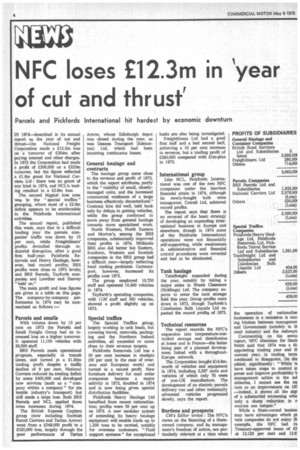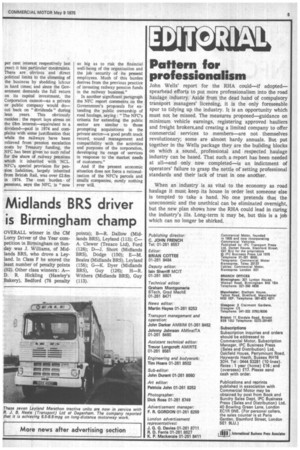NFC loses £12.3m in 'year
Page 6

Page 7

If you've noticed an error in this article please click here to report it so we can fix it.
of cut and thrust'
Parcels and Pickfords International hit hardest by economic downturn
IN 1974—described in its annual report as the year of out and thrust—the National Freight Corporation made a £12.3m loss on a turnover of £264m after paying interest and ether charges. In 1973 the Corparation had made a profit of £200,000 on a £223m turnover, but the figure reflected a £1.6m grant for National Carriers Lx1: there was no grant of any kind in 1974, and NCL's trading resulted in a £3.9m lass.
The second biggest loss area was in the "special traffics" grouping, where most of a £2.6m defitit appears to be attributable to the Pickfords International activities.
The annual repore, published this week, says that in a difficult trading year the parcels companies' traffic was down by 15 per cent, while Freightliners' profits dwindled !through indueerial disruption, after a good first half-year. Pickfords Removals and Heavy Haulage, however, had record profits; BRS profits were close to 1973 levels; and BRS Parcels, Tayforth companies and Lawther and Harvey "held on."
The main profit and loss figures are given in a table on this page. The company-by-company peeformatice in 1974 may be summarised as follows :
Parcels and smalls
With volume down by 15 per cent on 1973 the Parcels and Small Freight Group had An increased loss on a higher turnover. It operated 11,100 vehicles with 28,500 staff.
BRS Parcels made operational Progress, especially in transit times, and turned in a £1.93m trading profit despite a traffic decline of 9 per cent. National Carriers reduced its trading deficit by some £400,000 and developed new services (such as a "company within a company" for the textile industry's 'transport) but sill made a large loss. Both BRS Parcels and NCL applied three rates increases during 1974.
The British Express Carriers group (now including Scottish Parcel Carriers and Tartan Arrow) went from a £549,000 profit to a £520,000 loss, largely through the poor performance of Teurtan Arrow, whose Edinburgh depot was closed during the year, as was Deanes Transport (Edmonton) Ltd, which had been incurring comminuous losses.
General haulage and contracts
The haulage group came close to the revenue and profit of 1973, whieh the report attributes partly to the "viability of small, closelymanaged units, and the increased commercial resilience of a large business effectively decentralised." Contract hire did well, held back only by delays in getting vehicles, while the group continued to move away from general haulage towards more specialised work.
North Western, +North Eastern and Morton's, among the BRS companies, subatantially improved their profits in 1974, Midlands BRS also did beeter but Eastern, Southern, Western and Scottish companies in the BRS group had a difficult year—largely reflecting local trading problems. Cartransport, however, •increased its profits over 1973.
The group employed 10,750 staff and operated 10,400 vehicles in 1974.
Tayforth's operating companies, with 1130* zaff and 565 vehicles, showed a profit slightly up on 1973.
Special traffics
The Special Traffics group, largely working in unit loads, but covering travel, removals, packaging and the Northern Ireland activities, all exceeded or came close to their revenue targets.
Pickfords Removals Ltd has a 30 per cent increase in receipts (50 per cent in the case of overseas and European work) and turned in a record profit. New furniture delivery for mail order companies became a major activity in 1973, doubled in 1974 and •is now being given special distribution facilities.
Pickfords Heavy Haulage Ltd benefited from recent rationalisation; profits were 50 per cent up on 1973. A new modular system of extending its heavy haulage equipment will enable loads up to 1,200 tons to be carried, notably for overseas customers. "Fluid support systems" for exceptional loads are also being investigated.
Freightliners Ltd had a good first half and a bad second half, achieving a 10 per cent. increase in revenue, but a enacting profit of £280,000 compared with Elm-plus in 1973.
International group
Like NCL, Pickfords International was one of the two NFC companies under the heaviest financial strain in 1974, although its newly-bought bulk wine transporter, Cotrali Ltd, achieved record profits.
The report says that there is no reversal of the basic strategy of developing an expanding international business in Europe and elsewhere, though in 1974 some of the Pickfords International operations were net financially self-.supporting, while weaknesses in administrative and finanoial conerol procedures were revealed and had to be eliminated.
Tank haulage
Tankfreight expanded during the year, notably by taking a major stake in Waste Clearance (Holdings) Ltd. The company expects to enter the tank storage field this year. Group profits were down in 1973, though Tayeznah's Caledonian Bulk Liquids Ltd repeated the record profits of 1973.
Technical resources
The report records the NFC's expansion into temperature-controlled storage and distribution at home and in France—the latter being pare of a planned development linked with a throughoutEurope network.
The Corporation bought £14.8mworth of vehicles and equipment in 1974, including 3,297 units and vehicles of which only 76 were of non-UK manufacture. The development of an electric parcels delivery van and other technically advanced vehicles progressed slowly, says the report.
Burdens and prospects CM's Editor writes : The NFC's views on the financing of a Stateowned company, and its management's freedom Of action, are particularly relevant at a time when
the operation of nationalise businesses in a recession is catu ing friction between managemer and Government (notably in th steel industry and the railways Commenting on his ennui report, NFC chairman Sir Dank Pettit said that 1974 was a di: appointing trading year and th current year, in trading term continued to disappoint. He the added, significantly : "While w have taken steps to control e] pease and improve profitability b management action in the suit sidia ries, I cannot see the ou turn as an improvement an 19'7 —indeed, it shows all the sigr of a substantial worsening whic only a sharp reduction in n sources can temper."
While a State-owned businer may have advantages which pr vete companies do not enjoy (ft example, the NFC had ta Treasury-approved loans of E5 at 12:125 per cent and 12.8' per cent interest respectively last year) it has particular constraints. There are obvious and direct political limits to the slimming of the business by shedding labour in hard times; and since the Government demands the full return on its capital investment, the Corporation cannot—as a private or public company would do— cut back on "dividends" during lean years. This obviously rankles : the report lays stress on the £8m interest—equivalent to a dividend—paid in 1974 and complains with some justification that while the railways have been relieved from pension escalation costs by Treasury funding, the NFC has been given no such relief for the share of railway pensions which it inherited with NCL. NFC's special provision for pension liabilities, largely inherited from British Rail, was over £2.8m in 1974. The cost burden of pensions, says the NFC, is "now so big as to risk the financial well-being of the organisation and the job security of its present employees. Much of this burden derives from the previous practice of investing railway pension funds in the railway business."
In another significant paragraph the NFC report comments on the Government's proposals for extending the public ownership of road haulage, saying : "The NFC's criteria for extending the public sector are similar to those prompting acquisitions in the private sector—a good profit track record, sound management and compatibility with the activities and purposes of the corporation, developing its range of services in response to the market needs of customers."
And if the present economic situation does not force a rationalisation of the NFC's parcels and smalls companies, surely nothing ever will.




























































































































































